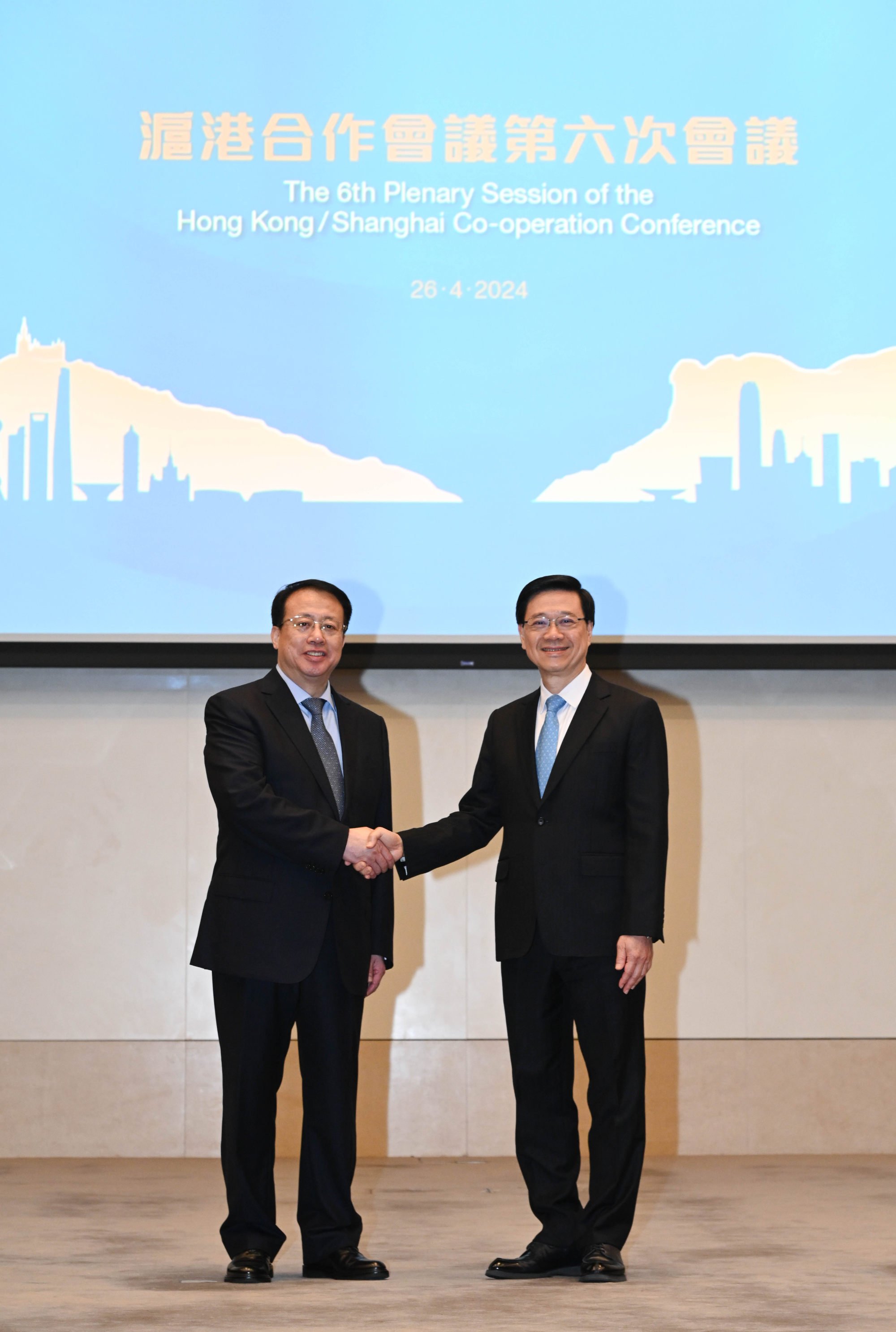
Hong Kong signs 20 cooperation documents with Shanghai to boost ties in digital economy, finance, among other fields
- City leader John Lee says two cities have reached consensus on 65 projects spanning 15 sectors, including innovation, technology and industrial development
- Shanghai mayor Gong Zheng says strengthening cooperation with Hong Kong is of ‘great significance’ in promoting respective prosperity and development
Hong Kong has signed 20 cooperation documents with Shanghai to strengthen ties across various industries, following a conference seeking to bring the two cities closer.
Chief Executive John Lee Ka-chiu said on Friday that Hong Kong and Shanghai had reached a consensus on 65 projects spanning 15 sectors, including innovation, technology and industrial development, urban and planning management, finance and the digital economy.
Following the Hong Kong-Shanghai Cooperation Conference’s sixth plenary session at government headquarters, the two cities signed 20 documents that focused on strengthening ties in areas including vocational and higher education, scientific research and people training, research and innovation, industrial collaboration, and international arbitration.
The conference was co-chaired by the chief executive and Shanghai mayor Gong Zheng, who led a delegation from his city.
“The sixth plenary session held today is another important milestone in Shanghai-Hong Kong cooperation,” Lee said in his opening speech.
“Hong Kong will continue to leverage its unique advantage of being backed by the motherland and connected to the world under the ‘one country, two systems’ governing principle, continue to deepen cooperation with Shanghai and work together to develop each other’s new quality productive forces, and jointly contribute to the country’s high-quality development.”
Lee said the conference enjoyed strong support from central and Shanghai authorities, with exchanges between the two cities becoming more frequent since it was established in 2003.
The total investment from Hong Kong businesses in Shanghai had also grown from US$2 billion in 2003 to US$17.4 billion last year, he noted.

Hong Kong’s leader also said the city had become one of Shanghai’s major export markets and its largest source of foreign investment.
Gong said Shanghai and Hong Kong were the country’s two most international and modern cities, with the pair cooperating in areas such as economy, trade, science and technology, as well as culture over the years.
“Strengthening cooperation between Shanghai and Hong Kong is of great significance to promoting the prosperity and development of the two places and better serving the country,” the mayor said.
Gong said Shanghai was ramping up efforts to turn itself into a socialist, modern and international metropolis under Chinese President Xi Jinping’s strategic planning, while Hong Kong was also consolidating and upgrading its status as an international centre of finance, shipping and trade, as well as continuing to enhance its core competitiveness.
“We sincerely hope that the two cities will take the signing of the new round of cooperation memorandums as an opportunity to deeply align their development strategies, carefully create cooperation highlights, and jointly promote the development of Shanghai-Hong Kong cooperation to a new level,” he said.
Hong Kong’s economy grew between 2.5% and 3.5% in first quarter, Paul Chan says
The Hong Kong-Shanghai Economic and Trade Cooperation mechanism was established in October 2003, later being renamed the Hong Kong-Shanghai Cooperation Conference after the third plenary session in 2015.
The fifth plenary session was held in August 2021, with the two cities reaching a consensus on 13 areas of cooperation, including expansion into mainland China’s domestic market and the Belt and Road Initiative, cultural and creative industries, and innovation and technology.
Other areas of cooperation included finance, education and talent development, legal and dispute resolution, healthcare and medicine regulation, youth development, facilitation of Hong Kong people’s development on the mainland, civil aviation, and maritime transport and logistics.
Lee led a delegation to Shanghai in November last year, which marked the 20th anniversary of the conference’s establishment.
Hong Kong leader John Lee pursues stronger economic ties with Shanghai at CIIE 2023
Separately, Lee told a reception to mark the coming Labour Day that a pilot scheme to encourage employment among jobless middle-aged residents would be implemented from July 15.
The Re-employment Allowance Pilot Scheme, announced in his policy address last year, aims to encourage those aged 40 or above who have been unemployed for three months or more to rejoin the workforce.
Beneficiaries will be provided with a maximum allowance of HK$10,000 after working for six consecutive months.
The city leader said he expected the scheme would further boost the labour force while ensuring local workers were given priority for employment.
Lawmakers, meanwhile, were told Zheng Yanxiong, director of Beijing’s liaison office in Hong Kong, would attend a lunch with them on June 28 after an invite from Legislative Council president Andrew Leung Kwan-yuen. It will be Zheng’s third meeting with legislators in Legco in a year.
Additional reporting by Natalie Wong

